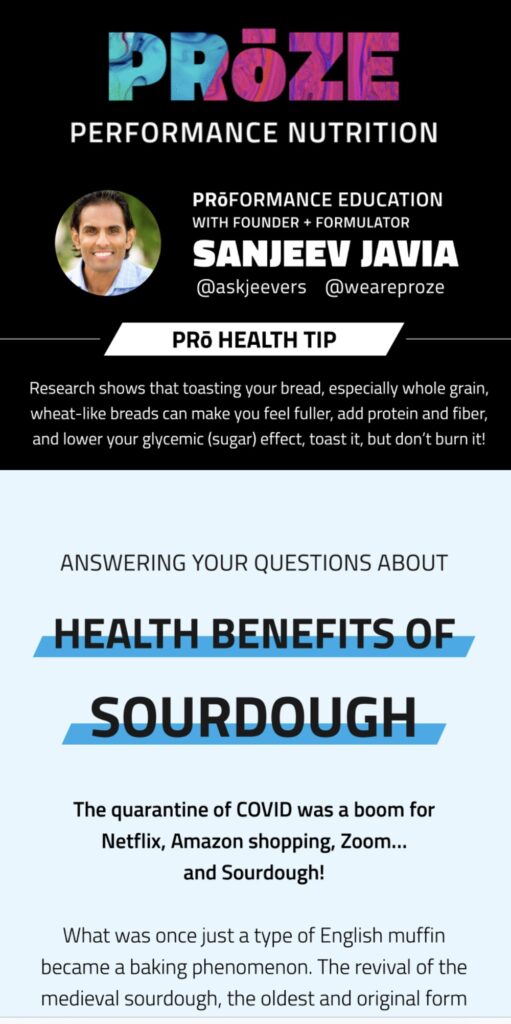Let’s Get Electric!
If you’re a health enthusiasts or concerned Mom, you’ve probably heard about how terrible Gatorade is for you. The sugar, the sugar, the SHUGaaa! A whopping 35+ grams in some versions. But hold on, that’s only 30grams of the story, what about the Electrolytes? A much smaller amount (milligrams), these little mineral jewels are what Gatorade was REALLY developed for and with the recent popularity in powdered electrolyte powders like Liquid IV, LMNT, SOS, and Gatorades own version, many people are starting to agree. The coaches shouts of “drink your water, get your hydration” have been replaced with “get plenty of electrolytes”…but should we really be getting so Electric about Electrolytes??
Q: What are electrolytes?
A: They are specific minerals that help to conduct the electrical signals in our body. Calcium, Magnesium, Sodium, and Potassium are in the highest concentration and then the lesser ones are Chloride and Phosphate.
Q: Why are they so important?
A: Your body is electric, you have a slight electrical current running through your body at all times. This is how the brain is able to send messages to the rest of your body. Muscle contraction/relaxation, management of blood pressure, the functioning and beating of the heart (think of the AED – electrical paddles to restart your heart), occur because of this current, Electrolytes is what allows the blood and water in the body to conduct this electricity, it electrically charges the body. Without electrolytes your blood and the water in your body is not “active” you wouldn’t be able to function.
Q: What else does Electrolytes do?
A: Electrolytes are needed for most all metabolic functions to take place, but two other very important ones is fluid balance, keeping enough water inside and outside of the cell (cellular hydration), and balancing the pH of the body, making sure you’re not too acidic (alkaline health). Minerals are “basic”, they reduce the acidity in the body, bases neutralize acid. Inflammation is highly acidic, without minerals the inflammation would break down and destroy the body, electrolytes keep your internal environment safe from corrosion.
Q: How much do I need per day?
A: It all depends on fluid loss. We lose electrolytes two ways – sweating and urinating. We sweat about 1.5 gallons per day and if we’re active, we can sweat out 4-5 gallons. 1 gallon of sweat has about 3.3 grams of Sodium, so if you’re hanging out, just living life, you’ll need about 3-4 grams of Sodium per day. If you’re working out really hard or you’re an excessive sweater, you could need up to 16 grams. You do store these minerals, so you don’t necessarily need it all at once, so a typical intake per day is:
Sodium – 1300mg
Potassium – 4700mg
Calcium – 1200mg
Magnesium – 500mg
Chloride – 2300mg
Q: Seems like we’d need more Sodium?
A: Our diets are typically high in Sodium and we consume a lot of salt (SodiumChloride – NaCl). Seasoning, processed foods, flavorings, all have lots of Sodium, so we don’t need to add more. Balance is critical though. You’ll notice Potassium is higher because Sodium and Potassium work together, they work in conjunction and for optimal function of the cell, you need the proper balance.
Q: Why does Gatorade have so much Sodium?
A: Timing. Gatorade was made not as a “sit around drink”, it was made for active, VERY active people. Those who were doing intense (football, running, cycling, etc..) activities for over an hour, specifically 2+ hrs. In these cases, you’re sweating excessively and need to replace those electrolytes quick or your body will go haywire (the electric signals would not be as strong or move quickly). Gatorade was intended to replace electrolytes quickly and give you immediate energy….hence the SUGAR!
Q: So the sugar isn’t bad?
A: Not if you need it. For those running marathons, playing football in heat with pads, exercising for multiple hours, Gatorade fits well, problem is, most people don’t work out as intensely to use up the sugar or even the electrolytes.
Q: Do I need sports drinks or electrolyte powders?
A: If you’re eating a good diet, not as excessive sweater, and not working out for more than 2hrs, most likely not. You’ll get plenty of electrolytes from the foods you eat. The key places to find them are Fruits, Vegetables, Seeds, and Nuts. Minerals are found in the soil, so anything grown in the soil, will have electrolytes.
Q: What happens if I take too much?
A: Electrolytes are 100% about balance with each other and water (hydration). If you throw off the balance by taking too much of one, you’ll have issues. It’s interesting, the symptoms of too much are similar as not enough. Irregular heartbeat, dizziness, muscle spasms, cramps.
Q: How do you use Electrolyte drinks/powders?
A: I’ll use them AFTER a really intense workout (either I’ve sweat a lot in a hour or worked out more than 90 min), if I hike/bike in hot weather, and if I’ve drank alcohol…before I head to sleep and the first thing in the morning. Alcohol is a diuretic, it flushes electrolytes out of the body, which may cause you to have a headache or feel fatigued the next day. I use powders a lot more because they have little sugar and easier to carry around. Doesn’t matter how much water I put it in, but I try to drink it as much water as I can, but it’s not super important, I just want the electrolytes.




